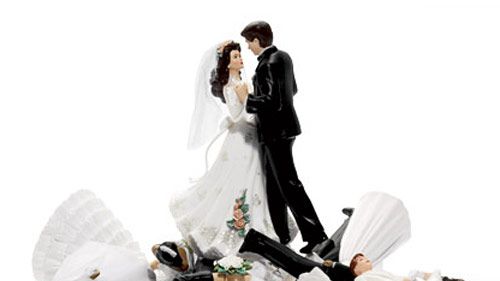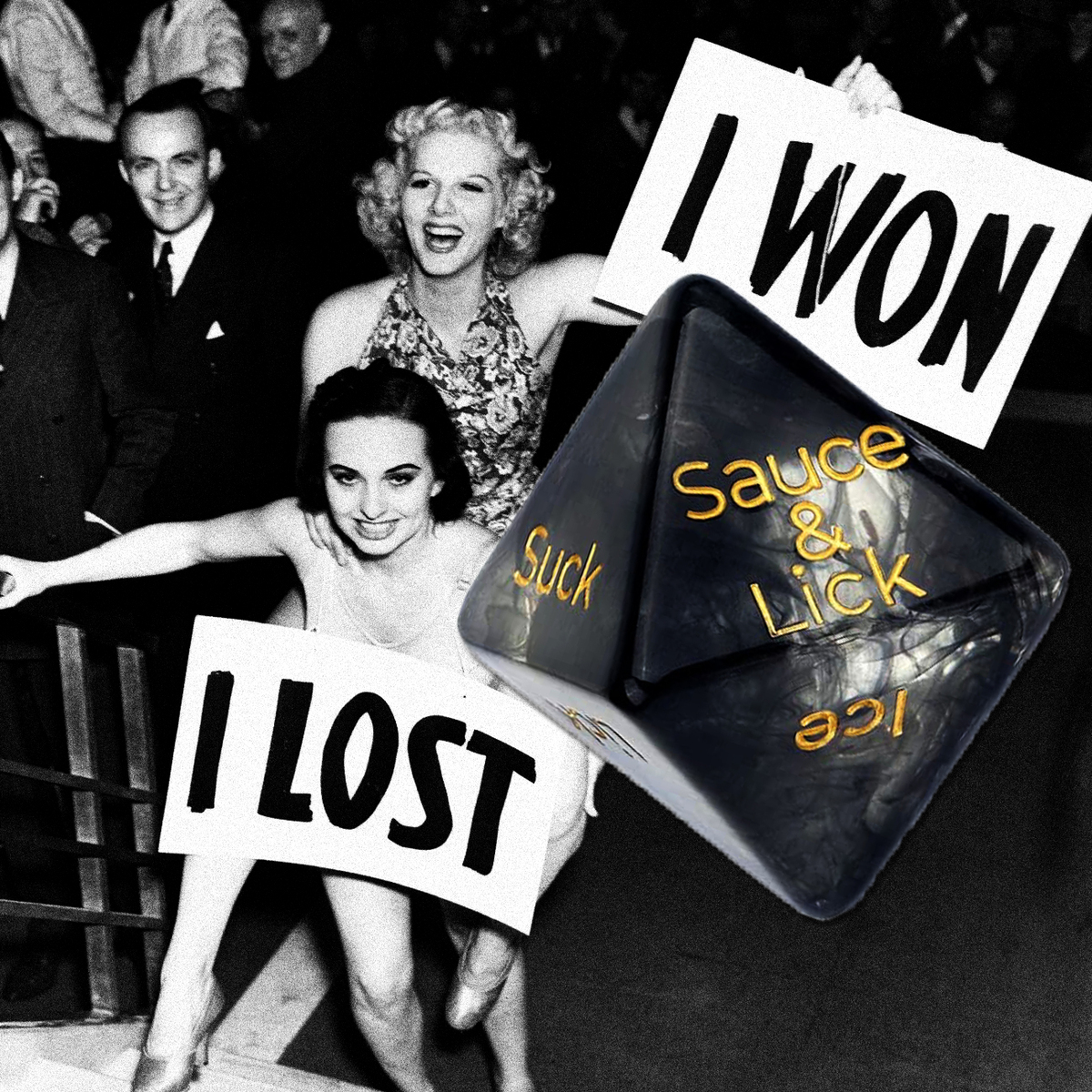Married With Baggage
When Rudy Giuliani and his wife, Judith, revealed that they had six marriages between them, the country raised a collective eyebrow. But for JOEL ROSE and his wife, it took that many just to get it right.

I was upstairs, my wife was downstairs. The phone rang, and I heard her pick it up. A few moments later she was shouting up at me: "Joel, when were we married?" I scratched my head and held off answering for a minute while I thought. Truth was, damned if I knew.
As it happened, Karen was on the line with our banker, trying to put together some last-minute details for a fixed-rate mortgage. She claimed the woman was laughing at her, at the idea that neither she nor I knew the date of our anniversary. Bad enough we couldn't figure out the day, we couldn't even narrow it down to a year. Not even ballpark. "We'll call you back," Karen said into the receiver. In our defense, between us, we've been married six times. Three each. So the bloom is a little bit off the rose, if you know what I mean.
If you take all the years of marriage between us in aggregate, Karen and I have been married for 36 years. We passed silver and are well on our way to gold. In the 11-and-a-half years we've been together (not all of them married, mind you), we've often reflected on the time apart with the belief that it took all that growing up, all that heartbreak, and the failure of our previous marriages to get to a place where things work between us. There is something to be said for the wisdom gained from decades of marriage. I can't speak for our exes, but it certainly has benefited the two of us.
Of course, taking a second and third crack at marriage isn't a new concept. But the six-marriage couple recently joined the mainstream when Rudy Giuliani's wife, Judith, admitted that she had been married twice before. That's right, a presidential front-runner for the party that supports family values -- which rather counterintuitively holds that if you marry more than once it means you hate marriage -- and his wife were on their collective sixth. And while the pundits debated what the revelation said about hizzoner's own family values, Judith offered this: "I think it makes you appreciate marriage a little bit more."
The first time Karen married, she married the old-fashioned way. She dated her intended, had a formal engagement, then planned and had a church wedding. It took a year of marriage for her to realize that she didn't know her husband at all. He had a secret other life, and seven years after their white wedding, he died from disease unchecked. Karen was lucky enough to come out of it unscathed -- at least as far as her physical health was concerned. The episode led her to a near-breakdown and left her mistrusting her own instincts.
Her second marriage was as impulsive as the first one was planned. He was not such a miserable choice, especially considering she'd committed to the decision after only 12 hours of knowing him, but in the end they just didn't make each other very happy. Where her first marriage failed due to epic betrayal, the demise of her second was prompted by a series of petty complaints. The one that seems to have goaded her the most was the way he referred to her as "my wife," as in, a piece of property. Hardly grounds for divorce, but it did speak to Karen's intense conviction that marriage does not equal ownership.
For me, my first wife was the love of my young life. I was only 22 years old, and she was 20, when we married. Barely adults. Life was all possibility, except the possibility of failure. We found we didn't know who we were alone, much less together, and that is a fatal flaw in relationships. We had the best intentions, and we tried, but we just couldn't make it out of our 20s.
Stay In The Know
Get exclusive access to fashion and beauty trends, hot-off-the-press celebrity news, and more.
My second marriage was to a French woman who swore to me up and down she would never marry. At first, we lived together outside the country. We had a child, but when we tried to come to New York, immigration denied her entry. We married in Montreal for her green card and spent many wonderful years together. What I learned over the course of that relationship, however, was the sad fact that whatever irreconcilable conflicts and problems a couple might have early on will likely arise to cause its demise. From the beginning I was frustrated by my inability to satisfy her emotional needs at the expense of my own. In the end, my needs won out, for better or worse.
One day soon after we had gotten together, Karen and I were walking past Henry's, the Chinese laundry where we brought our clothes. Suddenly, she turned to me, this look in her eyes, and kissed me. "Don't ever ask me to marry you," she said emphatically. "Okay," I agreed.
So, looking back, it seems curious and miraculous that after our longtime accountant suggested that we get married for tax reasons, without much discussion Karen and I met during our lunch hour at the Office of the City Clerk to file a marriage application. We used each other's backs as desks while we filled in the blanks. The next day we returned for the 90-second ceremony. We'd been living together for five years; we had a son. Still, in that shabby municipal office, newly married, each for the third time, we were happy, even a little giddy, kissing, if you can believe it, almost shyly. For our honeymoon (of sorts) we went to Chinatown. The festivities ended with fortune cookies. Hers, I think, read "Look before you leap!"
Now well into it, our marriage seems to be working. We have figured our way through financial difficulties without blame, pulled through illness with grace, and given each other the room to behave badly from time to time without judgment. Karen forgave the lies I told early on, and I endure her slight tendency to tyrannize.
There are moments, though, that test the day-to-day tolerance necessary in any marriage. Since we've been together, I've been known to call Karen by my second wife's name. It's innocent enough, I like to think, since the first syllable of each name is the same.
When I commit this particular atrocity, Karen doesn't seem to mind. She doesn't need to pretend that she is the one and only in my life, as I am not the only one in hers. The common-enough confusion of names is just another persistent indication of the baggage we each bring to the relationship. That said, she is not past correcting me in a certain...er...tone.
Recently, at a public reading of my new novel, in an effort to express my thanks to Karen for her loving support, I managed to correctly say her first name. I then experienced vapor lock and flubbed her last name, calling her by the surname of my second ex. In the audience, Karen sort of laughed. Perhaps her tolerance allows for her own occasional lapses.
Recently, she waxed nostalgic over one of our romantic escapades, walking back to Manhattan together over the Brooklyn Bridge at 4 in the morning, only to be gently but firmly reminded, "Karen, that must have been one of your previous husbands." She looked at me, perplexed, smiled sheepishly, and managed an "Oops." We like to tell ourselves that when we found each other, there were no fantasies involved, and still aren't. She will not make my life perfect any more than I will make hers perfect. I love her, she loves me; there's not going to be a hell of a lot more to be delineated. We agreed from the beginning that we would and could survive, each of us, if necessary, without the other. We are two people. We live together. We have children. We own property together but have separate bank accounts. We don't fetishize marriage by thinking we own each other.
When was that anniversary? We had to look it up for the banker and her mortgage forms. We have a file for personal papers in Karen's desk. There, I found it: March 21, 2001. Or was it the 23rd? I've forgotten already. I could go look it up again, but then, what does it matter? That first kiss, though -- that was 11 years ago, on August 1, 1996, at 10 p.m., during a full moon at the corner of First Avenue and Sixth Street.
-
 The 'You' Season 5 Cast Features People From Joe's Past, a New Love Interest, Madcap Twins, and More
The 'You' Season 5 Cast Features People From Joe's Past, a New Love Interest, Madcap Twins, and MoreHere's what to know about the star-studded final installment of the Netflix hit.
By Quinci LeGardye
-
 These J.Crew Sale Finds Basically Packed My Suitcase for Me
These J.Crew Sale Finds Basically Packed My Suitcase for MeI'm ready for my next vacation.
By Brooke Knappenberger
-
 Summer's Sportiest Shoe Trend Is Worth Shopping More Than Once
Summer's Sportiest Shoe Trend Is Worth Shopping More Than Once17 pairs from Nordstrom, Mango, and Zara I'm shopping now.
By Julia Marzovilla
-
 The All-Time Favorite Sex Positions of 11 Real Women
The All-Time Favorite Sex Positions of 11 Real WomenFeatures "It makes me feel like the sexiest woman on earth."
By The Editors
-
 The 22 Best Vibrators, According to Sex Toy Experts
The 22 Best Vibrators, According to Sex Toy ExpertsThe vibes are immaculate.
By Gabrielle Ulubay
-
 The 20 Best Sex Games for Couples in 2023
The 20 Best Sex Games for Couples in 2023Who said game nights need to be wholesome?
By Gabrielle Ulubay
-
 The 14 Best Lubes for Every Need
The 14 Best Lubes for Every NeedGood sex should always go smoothly.
By Gabrielle Ulubay
-
 30 Female-Friendly Porn Websites for Any Mood
30 Female-Friendly Porn Websites for Any MoodFeatures All the best websites, right this way.
By Kayleigh Roberts
-
 The 82 Best Cheap Date Ideas for Couples on a Budget
The 82 Best Cheap Date Ideas for Couples on a Budget"Love don't cost a thing." —J.Lo
By The Editors
-
 Diary of a Non-Monogamist
Diary of a Non-MonogamistRachel Krantz, author of the new book 'Open,' shares the ups and downs of her journey into the world of open relationships.
By Abigail Pesta
-
 COVID Forced My Polyamorous Marriage to Become Monogamous
COVID Forced My Polyamorous Marriage to Become MonogamousFor Melanie LaForce, pandemic-induced social distancing guidelines meant she could no longer see men outside of her marriage. But monogamy didn't just change her relationship with her husband—it changed her relationship with herself.
By Melanie LaForce